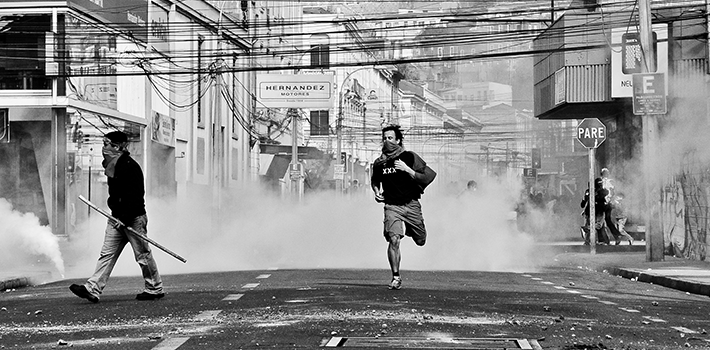
EspañolThe month of September has been scarred by violence in Chile, with the bombing of a subway station in Santiago and an explosion in Viña del Mar.
The attacks, within the context of President Bachelet’s “citizen government,” constitute a major challenge. She had hoped to return Chilean society to a place of dialogue, inclusion, representativeness, and plurality, while removing tension and social pressure.
Government representatives recognize these were acts with “terrorist characteristics,” but do not dare admit the possibility that terrorism could exist in the country — as if deliberately trying to confuse reality.
In my last column, I referred to Chile’s historical memory: a fragile matter full of sensitivities, unresolved conflicts, and false pronouncements according to what is defined as politically correct. The issue of terrorism in Chile, or “acts of a terrorist nature,” is a part of this narrative.
The general concept of terrorism as an extreme act that violates fundamental human values — life, safety, freedom, or the right to live without fear — has never been without controversy or polarized opinions.
It generates a strange and unpleasant sensation to think that there are terrorist acts that are more legitimate and socially understandable than others.
In Chile, due to the profound impact of its 20th-century history, terrorism has become a taboo word that offends the ears of politicians, ignites the passions of public opinion, and reveals a history of political, social, and cultural divisions. The word is so offensive that some media outlets hesitate before uttering it, often carefully placing it in quotes.
This is understandable to some degree, considering that the phenomenon in this case did not come from the outside but was born and operates from within. Terrorism in Chile serves as an evaluative concept: a great subjective burden, and a powerful rhetorical device capable of stalling any discussion on the problems of the present.
Powerful shadows hang over the issue, across the length and width of the political spectrum. The Chilean “right” goes on without ever having overcome the charges of “state terrorism,” while the so-called left — which now forms part of the New Majority — has still not yet faced its own past marked by episodes of political violence.
At times this blurs the lines of the debate; it generates a strange and unpleasant sensation to think that there are terrorist acts that are more legitimate and socially understandable than others. This heavy historical weight also causes the state to hesitate before establishing a visible security presence, responding to at least some part of society’s reluctance and mistrust.
The Anti-Terrorism Law, still in force in Chile, was enacted during the military dictatorship in 1984. Although it has undergone several modifications, for many it still lacks validity, given its credentials.
The Anti-Terrorism Law, as a matter of democratic integrity, should be revalidated, reformulated, and reenacted.
This is one of the reasons that its application during the past few decades has been characterized by clumsiness and what has always appeared to be a lack of conviction on the part of the state. This is the primary reason why this law, as a matter of democratic integrity, should be revalidated, reformulated, and reenacted.
A clear example of state’s clumsiness is evidenced by its handling of the violence in the Araucanía region surrounding the “Mapuche conflict.” The Inter-American Court of Human Rights has since ordered Chile to nullify the terrorism convictions in this case. Another example can be found in the way it dealt with the “caso bombas,” a series of bombings that previously shook the capital. It has also stifled the work of government bodies like the National Intelligence Agency (ANI) that exist to prevent incidents like this from happening.
The state, as a result, gives the impression that it is confused in terms of its ability to define, identify, and design an effective and adequate political strategy to confront this type of violence, while also avoiding state abuse.
This is why clear and consensual definitions are needed for all political actors, but only after stepping out of the shadows of the past. This requires courage and humility, and in the meantime, Chile will continue to experience the collateral damage of past traumas.
 Versión Español
Versión Español












